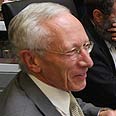
Bank Governor Stanley Fischer
Photo: Gil Yohanan
The Bank of Israel announced on Monday a 0.25% increase in the interest rate for January 2010, bringing it up to 1.25%.
A statement from the bank said it had based the decision to raise rates once again on the inflation in Israel, which has exceeded the government's target range for annual inflation (1%-3%), due in part to the rise in property prices.
It was the second consecutive month in which Bank of Israel Governor Prof. Stanley Fischer hiked interest rates by 0.25%. The rate before December's increase was 0.75%. Last August the rates were at an historic low of 0.5%.
Last Month
Gil Kol and Reuters
Bank says decision 'will help to establish inflation one year ahead firmly within target range'
"The current increase in interest is part of a gradual process of returning the rates to 'normal'," the statement said, adding that normality would be determined by international and local growth as well as interest rates abroad.
The bank puts this year's inflation rate at 3.8%, and predicts that it will reach higher levels in coming months. The statement says that Israel's market is slowly recovering from the recession, based on unemployment, production, and export data.
"However there is still a certain amount of uncertainty regarding the speed of recovery in the global market, which contributes to the uncertainty of the level of recovery in Israel," the bank said.
Fischer's main concern in raising interest rates was that it would create too large a gap between shekel and dollar worth. The US has left interest rates unchanged, which may raise the value of the shekel to levels that harm exporters.
Many commended Fischer on his decision, and Yashir Investment House stated that it was "inescapable". The group said leaving the rate as it was would have created a negative rate of 1.6%, which would have been harmful to the market.
More praise came from Uriel Levin, president of the Federation of Chambers of Commerce of Israel, who said the decision was a proper one "seeing as the Israeli economy is showing signs of recovery and the market is currently entering a process of renewal of growth and shrinking of unemployment."
He added that a high inflation rate, resulting from inaction, could destabilize the market.















